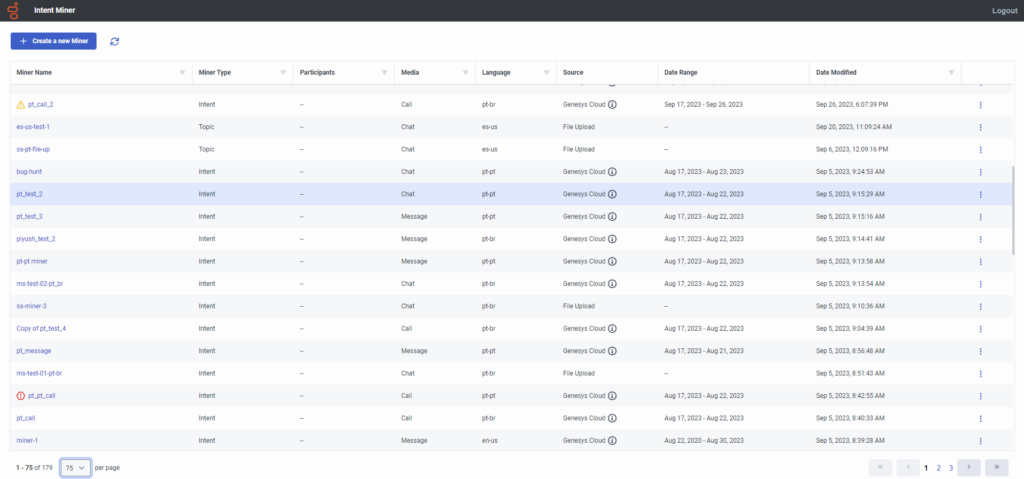Intent miner overview
Intent miner overview
Use the intent miner to help quickly identify user intents in conversations between customers and agents. Intent miner searches a historical set of conversation chat and voice transcripts between agents and customers for a specified date range. Next, it extracts the top set of intents and the analytics that surround those intents. Finally, it returns a list of intent utterances that the system associates with that intent.
You can import mined intents in Architect into a Genesys Dialog Engine Bot Flow or Genesys Digital Bot Flow for intent configuration. For more information, see Import mined intents into a Genesys Dialog Engine Bot Flow or Genesys Digital Bot Flow.
- You can only run up to five mining sessions at a time.
- You can save up to 100 intent miner sessions in a single org.
- You must have a minimum of 50 conversations available for the mining session. If you cannot meet the minimum, consider expanding the date range to include more conversations.
This section describes the available columns on the intent miner home page. The up arrows and down arrows in each column enable you to sort the information.
Next to the miner names, the following status icons can appear:
| Icon | Description | Appears when |
|---|---|---|
|
|
Error |
There is an error during
|
|
|
Warning |
There are less than 100 or more than 30,000 interactions present. |
To see an error or warning message, hover over the displayed icons. To see the current state of the mining session, hover over the progress spinner that appears while the mining session is in progress. When mining has successfully completed, the miner name appears in bold.
For more information about miner status types, see Miner statuses in Add a new miner.
To perform actions on a mining session, complete one of the following steps:
- To delete the miner, restart a failed mining session, or duplicate the miner, click the three dots at the end of the corresponding row, and select Delete, Rerun or Duplicate.
- To open the miner and view or make updates, click the miner’s row.
Click the image to enlarge.
| Column or object | Description |
|---|---|
| Miner Name | The name of the miner session. To open the miner and view or edit the intents, click the miner name. |
| Miner Type |
The type of mining session; either Topic or Intent. |
| Participants |
This column is for mining topics only. It shows whether topics are mined from internal agents, external customers, or both. |
| Media | The type of mined conversations: chat call, or message. |
| Language |
Select which dialect to mine in. This setting directs the intent miner to search for transcripts with the matching language. You can only select one language at a time. Intent mining supports search for the following dialects: en-US, en-AU, en-GB, en-IN, en-ZA, es-ES, es-US, fr-FR, fr-CA, and de-DE. |
| Source |
The source of the conversations for the mining session:
|
| Date Range | The start and end range that includes the mined conversations. |
| Date Modified | The last date that a miner was updated or draft intents were edited. |
What are intents and utterances?
Intents describe a goal or task that a user wants to do, such as tracking their package or booking a cab. A user interacts with a bot to resolve their intent. In bot design, intents and utterances form the basis of a dialog model. Example intents: Pay bill, Open account, Exchange rate.
Utterances are phrases or sentences that users would use to describe what they want to do. The bot tries to understand and identify the user’s intent from these utterances. A user can say: “I need a room for tomorrow” or “I want to book a room for tomorrow.” Both utterances convey the same intention: book a room for tomorrow. Another utterance might be: “Book me a suite for three nights starting tomorrow.”


